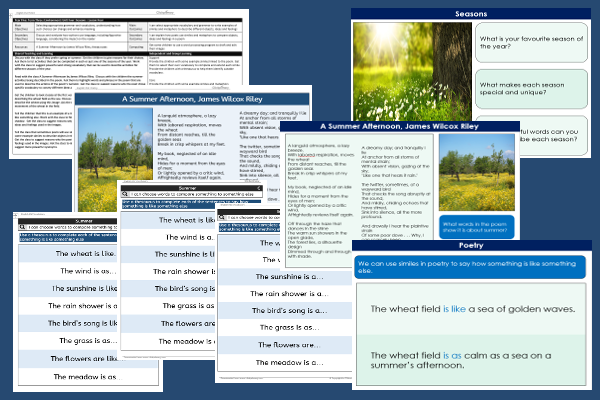Lesson Four – Poetry Images

This English teaching pack for Key Stage Two gets the children to investigate and record how to write similes and metaphors to use in lines for a poem comparing the four seasons in the year to some other objects, ideas and feelings.
The class can explain how and why poets use figurative language when describing a season to express changes that can occur during this time of the year.
Download this teaching pack including a lesson plan, classroom activities and an interactive presentation to investigate and record how to write similes and metaphors to use in lines for a poem comparing the four seasons in the year to some other objects, ideas and feelings
Activities in this teaching pack include a shared reading text to identify and explain how and why poets use figurative language when describing a season of the year when reading a A Summer Afternoon by James Wilcox Riley and a set of differentiated worksheets to practise writing similes and metaphors to compare the season of summer to other objects, ideas and feelings.
The interactive presentation gets the children to explore how to write similes and metaphors to compare the four seasons in the year to other objects, ideas and feelings.
This lesson is part of an English scheme of work to get the children to select figurative imagery to describe different seasons of the year for use in poetry, investigate spellings of words with different suffix endings and use modal verbs to compose lines of poetry. There are teaching activities for shared learning, differentiated worksheets to support independent learning and interactive presentations to introduce concepts and key skills.
-

Maths Arithmetic Assessment
Assess abilities in solving arithmetic number problems for addition, subtraction, multiplication and division when working with informal and formal written calculations
-

Environment
Identify and describe some of the special landscapes and locations that can be found in the world and reflect on how they can be protected and preserved for the future
-

Silent Letter Words
Explore and illustrate the meanings and spellings of some different words with silent letters when using them in a range of topics and scenarios
-

Complaint Letters
Explain and model how to format and structure writing when composing letters of complaint about different issues and scenarios
